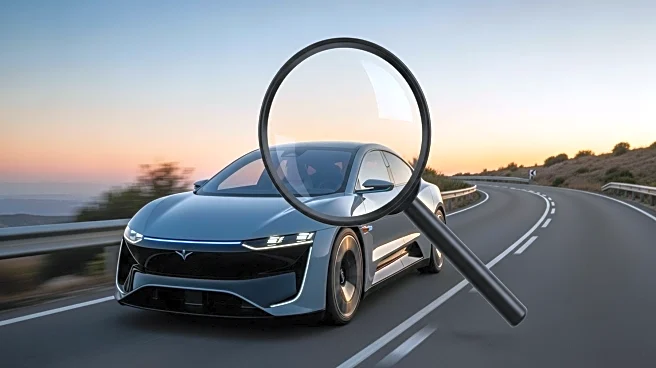What's Happening?
The National Highway Traffic Safety Administration (NHTSA) has launched a new investigation into Tesla's Full Self-Driving (FSD) system after reports of vehicles running red lights and driving on the wrong side of the road, leading to crashes and injuries. The probe covers 58 incidents involving Teslas equipped with FSD technology, which is criticized for misleading drivers into believing the system can operate vehicles autonomously. This investigation adds to several ongoing probes into Tesla's driver-assistance features, including issues with crash reporting and summon technology. The scrutiny comes as Tesla aims to deploy driverless taxis across U.S. cities by next year.
Why It's Important?
The investigation into Tesla's FSD system is crucial as it addresses safety concerns associated with autonomous driving technologies. The outcome could impact Tesla's plans to expand its driverless vehicle offerings and influence regulatory standards for self-driving systems. The probe highlights the challenges of ensuring safety in autonomous vehicles, which are expected to revolutionize transportation but face significant hurdles in public acceptance and regulatory approval. The investigation also underscores the importance of transparency and accountability in reporting incidents involving advanced driver-assistance systems.
What's Next?
As the investigation progresses, Tesla may face increased pressure to enhance its FSD technology and address safety concerns. Regulatory actions could lead to stricter guidelines for autonomous driving systems, affecting Tesla's business strategy and market position. The company may need to invest in additional hardware, such as radar sensors, to improve system reliability. Stakeholders, including investors and consumers, will be watching closely for developments that could influence Tesla's stock performance and the broader electric vehicle market.
Beyond the Headlines
The investigation raises ethical questions about the deployment of autonomous driving technologies and the responsibility of manufacturers in ensuring safety. The reliance on software updates for critical vehicle functions highlights the need for robust testing and validation processes. The scrutiny of Tesla's FSD system may prompt broader discussions on the regulation of autonomous vehicles and the balance between innovation and safety.










